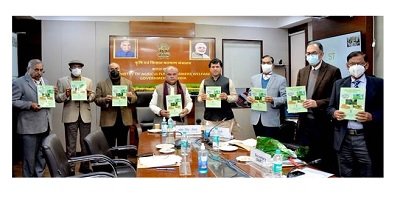More than 600 participants from various divisions participated in the conference
National Bee Board (NBB) recently organised a national conference on bee keeping sector in collaboration with the National Agricultural Cooperative Marketing Federation of India (NAFED), Tribal Cooperative Marketing Development Federation of India (TRIFED) & National Dairy Development Board (NDDB). More than 600 participants from government as well as the private sector, State Agricultural Universities (SAUs)/ Central Agricultural Universities (CAUs), Beekeepers and other stakeholders involved in beekeeping occupation, etc. attended the conference.
During the conference, Dr Abhilaksh Likhi, Additional Secretary, Ministry of Agriculture & Farmers Welfare, Government of India spoke on National Beekeeping & Honey Mission (NBHM), a central sector scheme launched by the Government of India for the overall promotion and development of scientific beekeeping in the country. The implementation of NBHM will be proven a huge step in achieving the ‘Sweet Revolution’ in the country.
Likhi expressed that NBHM will help in filling gaps in infrastructural facilities for honey and linking marginal beekeepers in an organised way for dealing with adulteration in honey. NBB has launched Madhukranti Portal for traceability of honey and& other beehive products viz.; bee pollen, bee wax, bee venom, propolis, etc. NBHM has the aim to create a network of honey testing labs covering all parts of the country and for this 100 FPOs of beekeepers will be proved as the centre.
Dr NK Patle, Additional Commissioner (Horti.) and Executive Director (NBB) emphasized on implementation of the NBHM scheme effectively all over the country and to provide factual benefits to beekeepers and other stakeholders associated with beekeeping occupation.
Dr Balraj Singh, Coordinator, AICRP on Honey Bee & Pollinator, ICAR, New Delhi, mentioned that currently there are 25 AICRP centres in the country, which are actively involved in research in beekeeping/ pollination. ICAR is on the way to creating Pollinator Gardens under AICRP centres across India. The first such type of Pollinator Garden has been established at Govind Bhallabh Pant University of Agriculture & Technology, Pantnagar, Uttarakhand.
Dr Arjun Singh Saini, Director General (Horticulture) spoke on the status and strategy for implementation of the Madhukranti Portal in Haryana. He informed that about 816 beekeepers with 1,29,652 honeybee colonies are registered on Madhukranti Portal from Haryana State.
Pankaj Prasad, Additional Managing Director and Unnikrishnan, General Manager from NAFED informed that NAFED is creating 65 clusters/ Farmers Producers Organisations (FPOs) of beekeepers/ Honey Processors. These 65 FPOs will be part of the honey corridor linking northwest to north-eastern regions.
Abhijit Bhattacharya, NDDB stated that NDDB has an approach of creating Honey FPOs in the line of Dairy Cooperatives for getting the benefit of infrastructural facilities available with Dairy Cooperatives/ Milk Unions.
Seema Bhatnagar, General Manager, TRIFED informed that TRIFED is already involved in promoting beekeeping in tribal parts of the country and procuring wild honey and has also exported to various countries honey worth Rs 115 lakhs during 2020-21.
A brief process of registration on the Madhukranti Portal was also demonstrated to participants/ beekeepers of this conference by Jai Prakash, Senior Manager, Indian Bank. Registration with Madhukranti Portal will help the beekeepers during the migration of bee colonies and also get insurance.
More than 600 participants from various divisions














